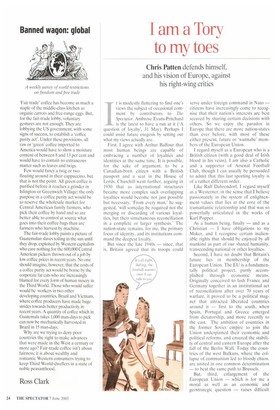Banned wagon: global
A weekly survey of world restrictions on freedom and free trade
'Fair trade' coffee has become as much a staple of the middle-class kitchen as organic carrots and free-range eggs. But, for the fair-trade lobby, voluntary gestures are not enough. They are lobbying the US government, with some signs of success, to establish a 'coffee purity act'. Under these provisions, all raw or 'green' coffee imported to America would have to show a moisture content of between 8 and 13 per cent and would have to contain no extraneous matter such as leaves and twigs.
Few would fancy a twig or two floating around in their cappuccino, but that is not the point. All green coffee is purified before it reaches a grinder in Islington or Greenwich Village; the only purpose in a coffee purity act would be to reserve the wholesale market for Central American family farmers, who pick their coffee by hand and so are better able to control at source what goes into their coffee bags than are farmers who harvest by machine.
The fair-trade lobby paints a picture of Guatemalan slaves toiling in the sun until they drop, exploited by Western capitalists who care nothing for the 600,000 Central American pickers thrown out of a job by low coffee prices in recent years. No one should imagine, however, that the costs of a coffee purity act would be borne by the corporate fat cats who are increasingly blamed for every form of human misery in the Third World. Those who would suffer would be workers in two other developing countries, Brazil and Vietnam. where coffee producers have made huge strides towards better productivity in recent years. A quantity of coffee which in Guatemala takes 1,000 man-days to pick can now be mechanically harvested in Brazil in 15 man-days.
Why are we trying to deny poor countries the right to make advances that were made in the West a century or more ago? Fair-trade coffee isn't about fairness; it is about wealthy and romantic Western consumers trying to keep Third World-dwellers in a state of noble peasanthocd.
Ross Clark










































































 Previous page
Previous page